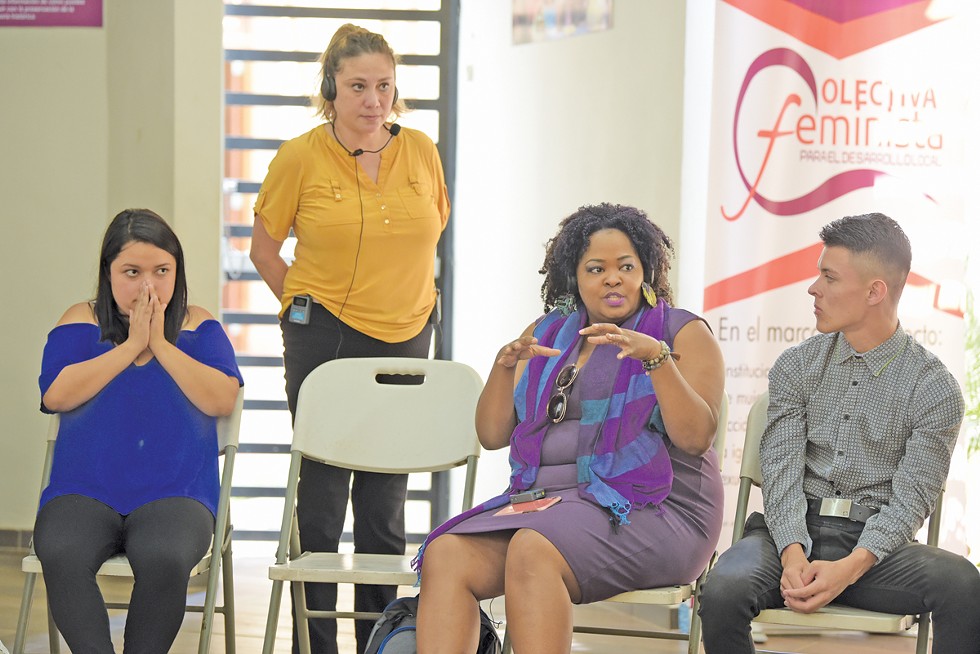Ohio's House Bill 413 is one of the most outlandish pieces of abortion legislation pursued to date in the United States. Like Republican lawmakers elsewhere, those in Ohio are salivating at the notion of overturning Roe v. Wade, the landmark 1973 high court decision legalizing abortion.
Medical professionals, scholars and constitutional experts are baffled at the lengths to which Ohio's legislators have gone in pursuit of their fringe partisan agenda. HB413, for example, includes a provision that would force doctors to re-implant ectopic pregnancies — a situation that results when fertilized eggs attach to something other than a woman's uterus. This procedure is medically impossible, yet doctors who refuse to perform it, under the law, would be guilty of "abortion murder."
"[HB413] is absolutely the most extreme abortion ban you could imagine, it is undoubtedly unconstitutional and frankly in a lot of ways I think it makes Ohio look extreme and foolish," CWRU law professor Jessie Hill told NewsChannel5 last week. "You can't find a single medical expert to support the idea that there is this treatment, a viable treatment that is described in the bill."
Hill and others noted the irony of a bill that purports to be "pro-life" recommending the death penalty in aggravated cases of so-called abortion murder.
Well, all this is par for the course for Ohio's retrograde statehouse, where many veteran Republicans have long pursued legislation of this sort for no other reason than mobilizing the most vocal elements in their gerrymandered districts.
State Rep. Stephanie Howse has watched this travesty play out. She represents much of Cleveland's east side, Newburgh Heights and Garfield Heights, and has found herself in a position of having to defend reproductive freedom because of the legislative predations of her colleagues. She traveled to El Salvador last month with other progressive legislators from across the country to learn about how strict abortion laws have affected the society there.
Shortly after she returned from her trip, she sat down with Scene to discuss what she saw in El Salvador, but the conversation turned to the Ohio statehouse more generally, and the strategies used by her colleagues to ensure that the voice of the people is not heard in Ohio government.
The conversation below has been edited for length and clarity.
Sam Allard: How'd you end up in El Salvador?
Stephanie Howse: I'm part of a progressive policy hub called SiX (the State Innovation Exchange), which started something called the Reproductive Freedom Leadership Council earlier this year. That network is trying to be proactive in passing legislation that will lead to reproductive justice for all Americans. That's the group that invited me.
What's funny is, I have never run on reproductive health issues. That's not why I went to the legislature in Ohio. I represent the poorest district in the state, and I'm intentionally there to try to break the cycle of generational poverty.
But as things have unfolded, many of the policies that are put forth in the chamber are a big distraction from people's economic reality, and I feel that I have to speak up against it. It's my job to bring back some reality, to ask, "How are these policies playing out in the lives of people's every day?"
People now think I'm like the reproductive freedom legislator, but I'm really not. That's not what people sent me to the statehouse for. But you've got to do what's right.
SA: I presume the reproductive freedom situation in El Salvador isn't great.
SH: Listen, the whole concept of life beginning at conception is in their constitution. That notion isn't based in science. It's based on people's belief. Just think about the idea of miscarriage. That's not really a concept in El Salvador. We met a woman on the trip who was serving 30 years in prison for a miscarriage, something that we'd refer to as an obstetric emergency.
SA: Or a tragedy.
SH: It's hard to fathom. Their constitution changed in '89, and in any government system, what happens to you depends on who's leading the charge at the moment and what they choose to enforce. The people in power now have chosen to charge miscarriages as aggravated homicides.
SA: I can't even ...
SH: It's crazy, I know. Now, I wasn't there to pass judgement. I was there to understand the context. When you put laws like this in place, what's the aftermath? And that's the point. El Salvador could easily be Ohio. Easily. When you look at who these laws affect, it's usually poor women. Poor families. If you don't have good representation, or people around you who are educated, you get caught up and are lost.
SA: Have you talked to your colleagues at the statehouse about the trip?
SH: Wooh child. No, I have not at this moment, but I am preparing to engage. It's difficult, though. You've got people who are promoting a mentality ...
SA: A radical anti-abortion mentality?
SH: All I'll say is that when people tell you who they are, you have to believe them. I have engaged my colleagues before, and they say, "This is just the way I was raised." And they're 60-plus years old. There's nothing I can say in a 15-minute conversation to change their mind. It may not be worth my time to even have that conversation. I think where I can be most helpful is raising awareness for everyday citizens, so people can really understand the connection, and how women are being criminalized here in America.
This is about economics and it's about bodily autonomy. People don't understand the history, but we are not very far removed from places and times when women were seen as property. People have used devious methods to keep women down under the guise of the law. We have to remain vigilant if we don't want to get played.
SA: What methods do you see being used now?
SH: Religion, for one. I always say, religion for who and for what? Many times it is so freaking laughable. Lawmakers are talking about "pro-life," but then give zero care about what sort of lives people are living. If they did, we'd have affordable housing. We'd have great education systems. We'd have family sustaining wages. We'd have access to healthcare.
SA: It's like that meme. Republicans care about protecting life until the moment you're born.
SH: Just none! And it's like, people, we have to stop allowing these legislators to use our emotions without looking at reality.
SA: You called legislation like this a distraction. That's strategic, right?
SH: Absolutely. It's very strategic. You have to understand, our path to the statehouse is through the primaries. So the aim is to rile up my base, the small percentage of people in my own party who are going to vote in the primary. And how do I do that? It's usually those three divisive issues: abortion, religion ...
SA: And guns?
SH: And guns! These are the issues that people go to the polls for, and that the legislators want to be seen as champions of. But if you look at these three issues, they have absolutely nothing to do with people's daily lives, with the growing divide between the haves and the have-nots. We need the zeal that we have for guns to be used to make life better for people. Where are the headlines about legislators making sure everyone has a decent place to live? Where's the rallying cry for that? Where's the rallying cry for the availability of nutritious food?
If "pro-life" is so important, why aren't we having big, bold ideas about life's basic necessities? Instead, we get 50 million big, bold ideas about stuff that's just meant to keep us frightened.
What's the one now? The in utero ... ?
SA: The ectopic pregnancy thing?
SH: Right! Where you're supposed to reinsert ...
SA: It's ridiculous. It's impossible.
SH: But this is where we've gone. We're legislating things that are not even real! Just to keep this narrative afloat.
SA: So what are progressive legislators supposed to do in that environment?
SH: Continue to fight. Continue to introduce legislation that is based on truth, on science. At the same time, you have to continue to educate and connect with Ohioans to let them know that this is not the reality. It may not be in my lifetime, or at least not in my time in the chamber, but Republicans won't always be in control. And when the tide changes, we'll have legislation ready to go.
But some of these lawmakers have the same mentality that I saw in El Salvador, where young women are often treated as the sacrificial lambs for families. No one cares about their future because there's an expectation that they don't need to be educated because their life will be connected to staying at home and caring for family.
When I championed equal pay for equal work to some of my colleagues, they told me, "Well, you know, my daughters stay at home and are taking care of my grandchildren, and they're doing just fine." I'm like, that's wonderful for your family, but that has nothing to do with men and women doing the same job and getting paid differently.
SA: Shouldn't the same logic apply to abortion? Like, if you're opposed to it for religious reasons, fine, but your religious beliefs shouldn't determine what other people ...
SH: It's not logical. And let me tell you something. People talk this big game until it happens to them. I can guarantee you — these are things that I know — for the men in that legislature, their wives have had abortions; their girlfriends and their mistresses have had abortions; their children have had abortions. Don't give me this crap! But you can talk this talk where it's good for everyone else, but it isn't good for you. It's so hypocritical. People are living all types of lives, and if people could see our true, full lives, I don't think anyone would take these laws seriously.

SA: They've got to keep up the brand, though. "Family values."
SH: It ain't no family values. It's not. They don't care about families. They're literally destroying families, separating them at the border. This is what I'm talking about! You cannot speak about families while you are causing irreversible harm to children and families. That's what's happening. Even when you talk about abortion, did you know that the majority of women who have abortions in the United States are mothers?
SA: I didn't, no.
SH: The majority. Mothers. What does that tell you? It tells you that this narrative of, "Oh, they're just using abortion as birth control," is not reality. All this type of stuff just puts the responsibility for abortions totally on women. Why haven't we ever turned the focus on men? There has never been ownership. Why not sterilize men? Let's get the nip-nips going! But oh no. Because we have a system that is dictated from the viewpoint of men, and so the blame goes only on women. It's absurd. And it's leading to people's deaths.
SA: Are lawmakers in Ohio consciously creating bills to challenge Roe v. Wade? Like are they jazzed up about that?
SH: Absolutely. That was the six-week abortion ban. It's intentional. But I've said, and I'll keep saying: Laws don't change human behavior. Laws say that murder is wrong. Stealing is wrong. Doing drugs is wrong. But people are still doing them. Our laws have been designed and set up with the intent to punish. They are not designed to restore, to bring people back into the fold. I wish people understood that we're all flawed, and the only difference between me and some other people is that I didn't get caught, or I had folks around me saying that I was a good girl, that I just made a mistake. We have been trained to think that laws are supposed to protect us, but that's not right. They are designed to protect certain people's interests.
SA: With these abortion laws, seems like the interests being protected are political interests. Rile up the base, keep the seat.
SH: And do you see how that is very different than enriching life in Ohio? If you were truly about protecting life, enriching life, supporting life, where's the access to affordable childcare?
A lot of people are getting played out here. They're getting hustled. They're getting pimped, if you want to talk in terms of "You go out and do my bidding, but I'm the one who's going to get paid." That's what's happening. I'm going to profit off of your pain, suffering and hard work. It's happening in Ohio and in America. These policies are destructive.
That's one reason I was so grateful to go to El Salvador. People need to know that we don't just live in Cleveland or Ohio or the United States. We're part of a global society. Many of us don't have any concept of a different reality, good or bad. We don't have any notion beyond what we know in our every day. So for those of us who have the opportunity to see different realities, it's important to share that with people, so that we can learn from it.
SA: What's the biggest lesson that can be learned from the reality you saw?
SH: People need to pay attention and then participate. We can't simply be spectators sitting idly on the sidelines. We need all hands on deck to make democracy work. And I'm not saying people need to know everything. I just hope that people will pick one thing. Pick one thing to help make Ohio a better place. And be an active participant in that one thing. And then hold people accountable for that one thing.
Right now, people are so disenchanted. They don't want to know about anything. They think all politicians are corrupt. And at the same time, every day, they're getting pushed around. They're stuck, and things aren't getting better. And they know that many times they're not even thought of in the political conversation.
SA: How do you convince those people to participate?
SH: By saying that the conversation is still happening. Laws are still being passed. And many times, we're taking your money to do it. To legislate against you.
But you don't want to vote? Man, just do your little part.
SA: It can be tough when the barriers to participation are so high.
SH: This is what I'm saying. The system doesn't want you to engage. That's why I don't put the responsibility on the backs of the majority of people who don't. It's confusing, and people are just barely getting by. That's why I'm trying to work in places and spaces to meet people where they are. Like I said, just connect people to one thing they care about. Life is too hard and too busy to expect people to know 100 different issues. But maybe you can get with 100 people who each know one issue. And you can all help each other. Each one teach one. But it's not going to get that way overnight, which is why I'm committed to just planting seeds, going along to get along when I have to, and raising hell when I need to.
SA: In Cleveland, I've seen exactly the sort of networking you describe in the past couple of years. There's been some incredible grassroots organizing, and it's led to real change.
SH: The blessing of us being in a participatory democracy is that when people come together to exert their power, it works. Our democracy is reactive. It's not proactive. The masses have to make those in positions of power do. If you ain't making 'em, they ain't doing it. And so that's what people have to understand. And that means holding me accountable too.













